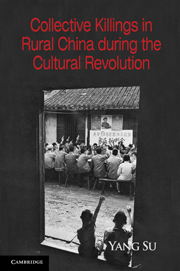Book contents
- Frontmatter
- Contents
- List of Figures
- List of Tables
- Preface and Acknowledgments
- 1 Kill Thy Neighbor
- 2 On the Record
- 3 Community and Culture
- 4 Class Enemies
- 5 Mao's Ordinary Men
- 6 Demobilizing Law
- 7 Framing War
- 8 Patterns of Killing
- 9 Understanding Atrocities in Plain Sight
- Appendix: Methodological Issues and Statistical Analyses
- References
- Index
4 - Class Enemies
Published online by Cambridge University Press: 05 June 2012
- Frontmatter
- Contents
- List of Figures
- List of Tables
- Preface and Acknowledgments
- 1 Kill Thy Neighbor
- 2 On the Record
- 3 Community and Culture
- 4 Class Enemies
- 5 Mao's Ordinary Men
- 6 Demobilizing Law
- 7 Framing War
- 8 Patterns of Killing
- 9 Understanding Atrocities in Plain Sight
- Appendix: Methodological Issues and Statistical Analyses
- References
- Index
Summary
In recounting a violent scene, a xianzhi compiler in Xingning County, Guangdong Province, focused on an encounter between a victim of the Cultural Revolution and a group of middle-school students. This moment combined innocence, hatred, and brutality and it raises questions about the concept of class enemies in Mao's China and the impetus behind ordinary people's contempt, hatred, and disregard of them. It was the summer of 1968; the place was dabali, or the Great Beach, an open space adjacent to a bank of the Ningjiang River, which runs through the county seat. A struggle rally had been attended by more than ten thousand people, including not only residents from the town but also peasants from nearby communes. Each commune had brought its own Four Types as struggle targets. A joint session like this one was rare; in less fanatical times, each commune would have its own rally. However, the Party Center had recently issued two new directives. The rally ended, the crowds receded, and militiamen began escorting struggle targets back to their respective townships. In at least four instances, however, the formations quickly degenerated into beatings and killings of the captives.
Among the dead and injured lay Mr. Lan, a man in his early forties. The road was deserted and daylight was waning when a group of middle-school students passed and noticed the bloody and broken body. Mr. Lan moved his lips, possibly asking for a sip of water or pleading for help.
- Type
- Chapter
- Information
- Publisher: Cambridge University PressPrint publication year: 2011



